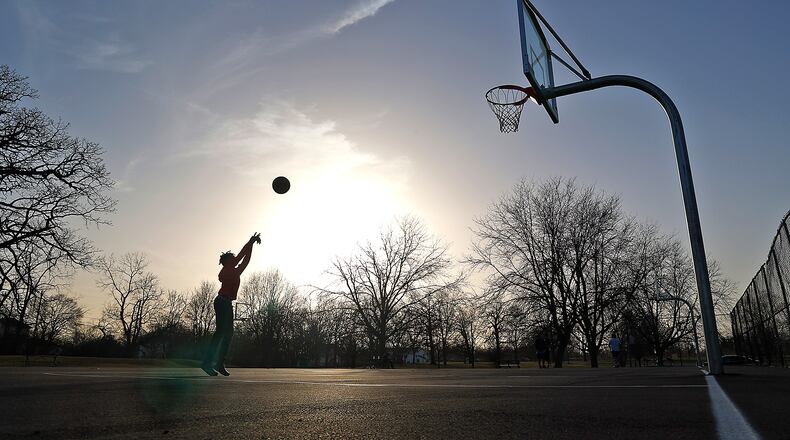The Conscious Connect, a Springfield-based non-profit geared toward education, culture and health, oversees the collective.
“We’re still in our early stages and synergizing, but we’re really emphasizing right now parks and green space equity,” the Wittenberg graduate and Springfield native said.
The collective contains groups that fit every need, Marshall said: Springfield Promise Neighborhood for education and the overall development of the south side; the 1159 South Community Development Corporation for housing; Young Black Professionals and Businesses of Springfield and DreamVision for business and networking; Gammon House for historic preservation; and Melrose Acres, Clark County Citizens’ Climate Lobby and Green Environmental Outreach for food accessibility and sustainability.
Green space within 10 minutes
Organizations in the collective supported The Conscious Connect with its application for a $500,000 grant through the Robert Wood Johnson Foundation and its partners.
Marshall and others at The Conscious Connect and the Unified Collective believe all people living in south Springfield should be within a 10-minute walk to a high-quality public park or green space.
According to The Conscious Connect, only 44% of residents in the city live within that 10-minute timeframe. This impacts children, adults, seniors and all people, regardless of income status.
“Although we know that low-to-moderate income neighborhoods in general and Black and brown neighborhoods are disproportionately impacted by environmental justice,” Marshall said.
Credit: Bill Lackey
Credit: Bill Lackey
The Conscious Connect has updated multiple green spaces already through property that was once either dilapidated buildings or vacant lots, acquired through the Clark County Land Bank.
Family-friendly parks – also called “pocket parks” – on Linden Avenue, Woodward Avenue and Grand Avenue resulted from those efforts.
1159 South Community Development Corporation co-founder and president Lori Searcy said her organization supports the efforts of The Conscious Connect for green spaces as another step toward economic development and engaging the community.
“Parks, they’re important,” she said. “Engaging the community is essential. It’s done to uplift people.”
‘Crisis’ living conditions for some
Searcy ‘s organization aims to bring safe, affordable housing to the city’s south side, with its focus first on the area from West Pleasant to West Johnson Streets between South Limestone and South Yellow Springs Streets – an area that contains more than 6,500 people, mostly Black.
The corporation restores houses and repairs necessities within, and often it will fully rehabilitate a building due to the state of disrepair it has fallen into, she said.
Housing is a health issue, and Searcy described some of the conditions people live in in the city as a “crisis.”
“People lose hope because of the conditions they’re living in,” she said. “A lot of bad things can flow from that.”
Springfield city leaders and community partners have also worked together to revitalize what the city calls “legacy neighborhoods.”
The city of Springfield has invested $12 million toward restoring streets in the area of Pleasant Street to Perrin Avenue, Limestone to Center Street and Center Street to Yellow Springs Street in two phases with ongoing work beginning in 2019.
More work needed for food security
Marshall said another passion of the collective is addressing the “food apartheid” in the community.
Food apartheid refers to how systems of institutional racial segregation and discrimination influence access to healthy, nutritious food.
Groceryland coming to south Springfield filled a “critical void” in town, Marshall said.
Because many people lack reliable transportation in the city, particularly the southern half, many are still too far away from the store to access its food.
“We still need to mobilize our additional efforts on the ground in order to change public policies surrounding food justice and the community in general, the southwest side of the city specifically,” he said.
Remembering the past, moving to the future
Gammon House president Dale Henry said it’s necessary to remember the past to move forward to the future.
“We’re struggling with some of the same things we did in the past,” Henry said.
Gammon House, located at 620 Piqua Place, is one of three Underground Railroad safehouses still in existence in Ohio that were owned and operated by a family of color.
Owners George and Sarah Gammon, who were free people of color, risked imprisonment and large fines for aiding and providing shelter to runaway slaves, according to Henry. Their house was built in 1850, the same year the Fugitive Slave Act was passed.
Gammon House annually hosts the Juneteenth and FatherFest celebration, one of the south side’s largest events.
Henry said he and others are continuing to work to build up Gammon House as a site to attract people to south Springfield.
“We’re just trying to do everything we can to play a role in the overall improvement of the south side,” Henry said. “We’re planning to do big things in the future, and Gammon House is going to be at the forefront of whatever’s happening for the south side of Springfield.”
Marshall said another portion of the city’s history will be recognized this fall with a historical marker to honor Springfield’s first Black lawyer, Sully Jaymes. The marker will be placed in one of The Conscious Connect’s parks on Woodward Avenue.
About the Author


